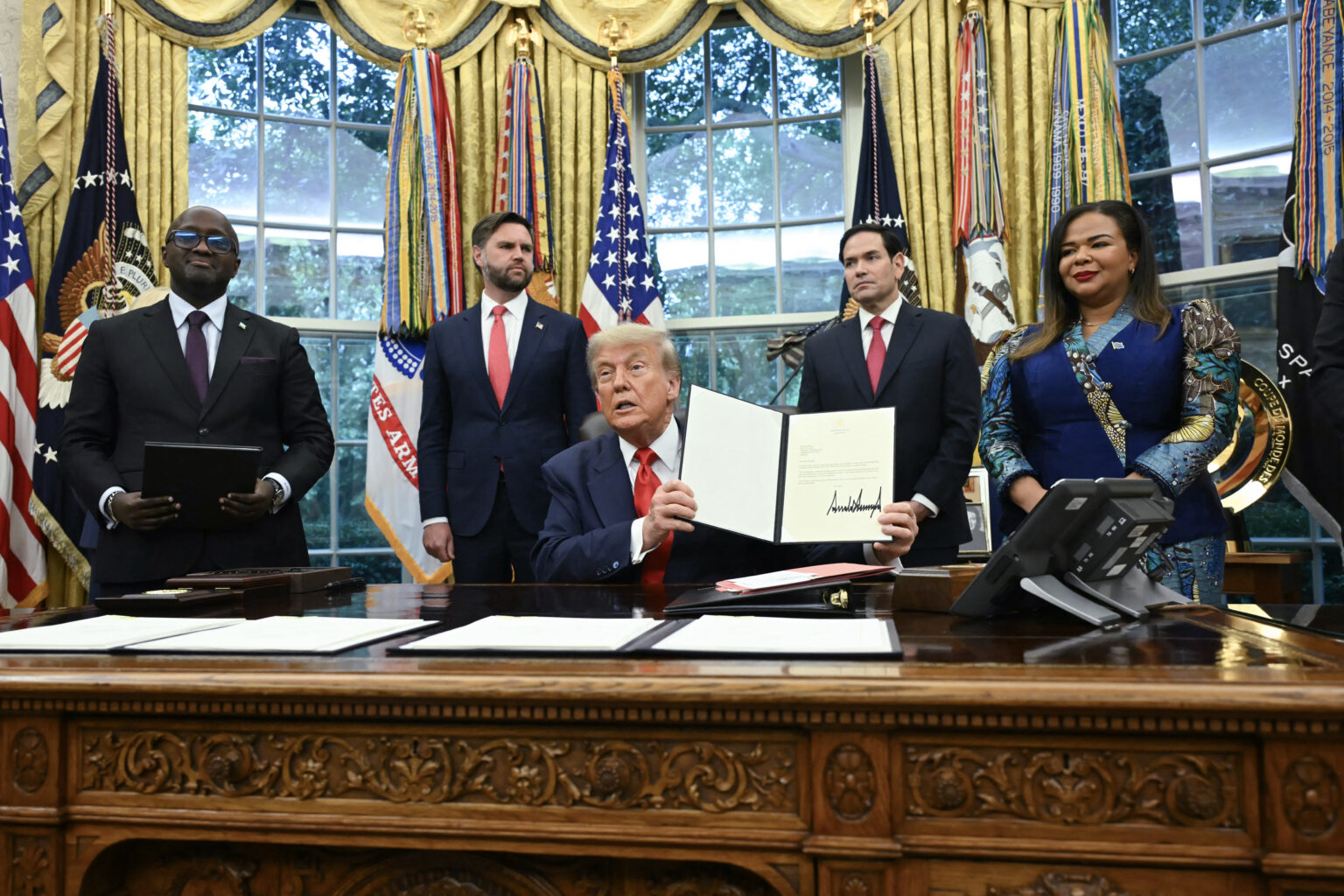A New Chapter in Central African Peace: Analyzing the Recent Rwanda-DRC Agreement
Diplomatic Milestone in the Heart of Africa
In a significant diplomatic breakthrough, President Donald Trump publicly celebrated a historic peace accord between Rwanda and the Democratic Republic of Congo (DRC) during a ceremony held in the Oval Office on Friday. This agreement, brokered with U.S. facilitation, marks a potential pause in a conflict that has persisted for over three decades, claiming millions of lives and destabilizing the region. Trump highlighted the deal as a testament to his role as a global peacemaker, emphasizing the importance of diplomatic efforts in resolving long-standing disputes.
Trump’s Global Peace Initiatives: A Mixed Record
This recent achievement is part of a broader pattern of international engagement by Trump, who has actively sought to mediate conflicts across the globe. His efforts include attempts to de-escalate tensions between India and Pakistan, as well as addressing conflicts in Iran, Ukraine, and Gaza. While some ceasefires, such as in Iran, have held, others remain fragile or unfulfilled. Trump’s approach often involves direct communication with world leaders, sometimes projecting an optimistic outlook that surpasses the assessments of local officials involved in the conflicts.
The Significance of the Rwanda-DRC Peace Deal
During the ceremony, Trump declared, “We just ended a war that lasted 30 years with 6 million lives lost,” asserting that no previous U.S. president could claim such an accomplishment. The agreement aims to cease hostilities and prevent support for armed groups operating across the borders. The foreign ministers of Rwanda and the DRC, who stood beside Trump, underscored the importance of translating this signed commitment into tangible action.
Rwandan Foreign Minister Olivier J.P. Nduhungirehe emphasized that signing the deal is merely the first step, stressing the necessity of effective implementation to usher in a new era of peace. The deal also includes commitments to deepen economic cooperation, particularly in the mining sector, where both nations seek to leverage their mineral resources-ranging from cobalt to gold-in partnership with U.S. investors and the government.
Challenges and Unresolved Issues
Despite the optimistic tone, many critical details remain unresolved. The agreement relies heavily on the parties’ self-enforcement, with no clear penalties outlined for violations. The region continues to face complex security challenges, with approximately 14,000 U.N. peacekeepers deployed in Congo to protect civilians from various armed factions, including the notorious M23 rebel group and the Allied Democratic Forces, which have links to extremist organizations like ISIS.
The ongoing conflict has displaced over 7 million people and has seen a resurgence of violence since January, notably with the M23 militia expanding its territorial control. The group claims to defend Congolese interests against perceived threats from neighboring Rwanda, which denies backing the rebels but is accused by Congo of occupying its territory to exploit mineral wealth.
Regional Dynamics and External Influences
The peace process is further complicated by regional and international factors. The Congolese government, which accuses Rwanda of supporting M23, is engaged in negotiations with rebel factions in Qatar, while also contemplating internal dialogues with opposition groups. Rwanda maintains that its military actions are aimed at countering the FDLR, a Hutu militia with roots in the 1994 Rwandan genocide, which operates within Congo’s eastern forests.
Analysts are closely monitoring whether the peace agreement will withstand the test of time, especially as confidence-building measures are set to be implemented in the coming months. The fragile nature of regional trust underscores the importance of sustained diplomatic engagement and effective enforcement mechanisms.
U.S. Involvement and Economic Interests
Trump’s administration has prioritized economic incentives as a means to foster peace, emphasizing Congo’s vast mineral reserves-home to the world’s largest deposits of cobalt, along with coltan, copper, and other critical metals. Despite these riches, Congo remains one of the poorest countries globally, with over 70% of its population living on less than $2.15 per day, according to recent World Bank data. The potential for economic development is hindered by corruption, ongoing conflict, and weak governance.
Trump’s focus on resource-driven diplomacy aims to leverage U.S. investment to stabilize the region, but critics warn that economic interests can sometimes overshadow genuine peacebuilding efforts. Diplomatic veteran Richard Haass pointed out that successful peace negotiations require a nuanced understanding of each side’s core interests, which often extend beyond the immediate terms of a deal.
The Road Ahead: Risks and Opportunities
While the signing of the agreement is a promising step, the path to lasting peace remains fraught with obstacles. Enforcement mechanisms are vague, and the region’s history of broken ceasefires and unfulfilled commitments raises concerns about the deal’s durability. Human rights organizations have documented serious abuses by armed groups, including forced displacement, sexual violence, and targeted killings, which continue to plague eastern Congo.
The international community, including the United Nations, must remain vigilant and supportive of these efforts. The presence of peacekeepers and ongoing diplomatic engagement are crucial to ensuring that the agreement translates into meaningful change on the ground. As Congolese Foreign Minister Thérèse Kayikwamba Wagne noted, “Some wounds will heal, but they will never fully disappear. Our commitment to implementation is what will determine the future of peace in this region.”
Conclusion: A Step Toward Stability or a Temporary Halt?
The recent Rwanda-DRC peace agreement signifies a noteworthy diplomatic achievement, offering hope for a region long plagued by violence. However, the complexities of regional politics, economic interests, and deep-seated grievances mean that this peace is only as strong as the collective will to uphold it. Continued international support, robust enforcement, and genuine reconciliation efforts are essential to transform this fragile ceasefire into a durable peace that benefits millions of Congolese and Rwandans alike.

